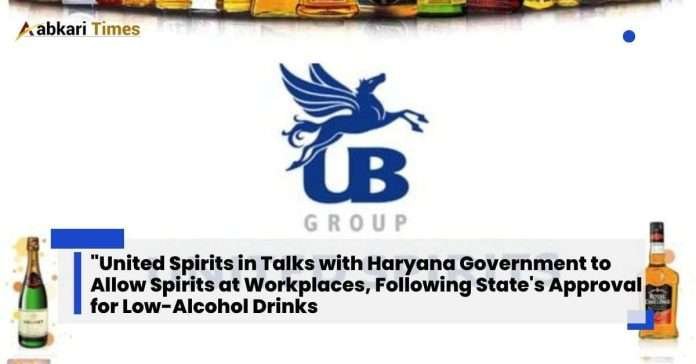United Spirits, the largest liquor company in India, is engaged in discussions with the Haryana government regarding the inclusion of spirits in workplaces. This comes after the state recently permitted low-content alcoholic beverages like beer, wine, and ready-to-drink beverages to be consumed within large corporate offices starting next month.
During an earnings call, Hina Nagarajan, CEO of United Spirits, mentioned that Haryana has shown progressiveness by allowing beer and wine, and they are in talks to explore the possibility of including spirits as well.
Under the state’s new 2023-24 excise policy, employees in offices with a minimum of 5,000 employees and a covered area of at least 100,000 sq ft will be allowed to possess and consume low alcohol content beverages.
The Confederation of Indian Alcoholic Beverage Companies (CIABC) acknowledged the significance of this decision, not in terms of potential sales volume, but as a shift in the government’s attitude towards alcohol. However, the CIABC has not yet made a request for the inclusion of liquor.
Vinod Giri, the director general at CIABC, stated that the decision recognizes the role alcohol plays in relieving stress after a challenging workday. He expressed support for the government’s pace and hoped that other cities like Delhi, Noida, Bengaluru, Hyderabad, and Mumbai would follow Haryana’s lead.
Industry executives reported that the spirits market in India witnessed a 12% increase in sales volume, reaching 395 million cases in the year ending March. This marks a significant rise from the previous high four years ago, contributing an additional 40 million cases, as per the latest data from the excise department.
Liquor companies typically need to advocate for price increases and regulatory changes since they are governed by state governments that also control retail and wholesale operations in various markets.
United Spirits, the maker of renowned brands such as Johnnie Walker and Smirnoff, mentioned that the Indian market is currently experiencing volatility due to ongoing changes in the distribution network and inflationary pressures. Despite the challenges, the company expressed confidence in its ability to adapt and seek growth opportunities in different states.
During the fourth quarter ending in March, the Diageo-controlled firm reported a 15.6% expansion in net sales after adjusting for the sale of certain brands a year ago. The prestige and above segment experienced a 23.2% growth, while net sales for the popular segment declined by 6.3% due to inflation affecting this price-sensitive consumer segment.













